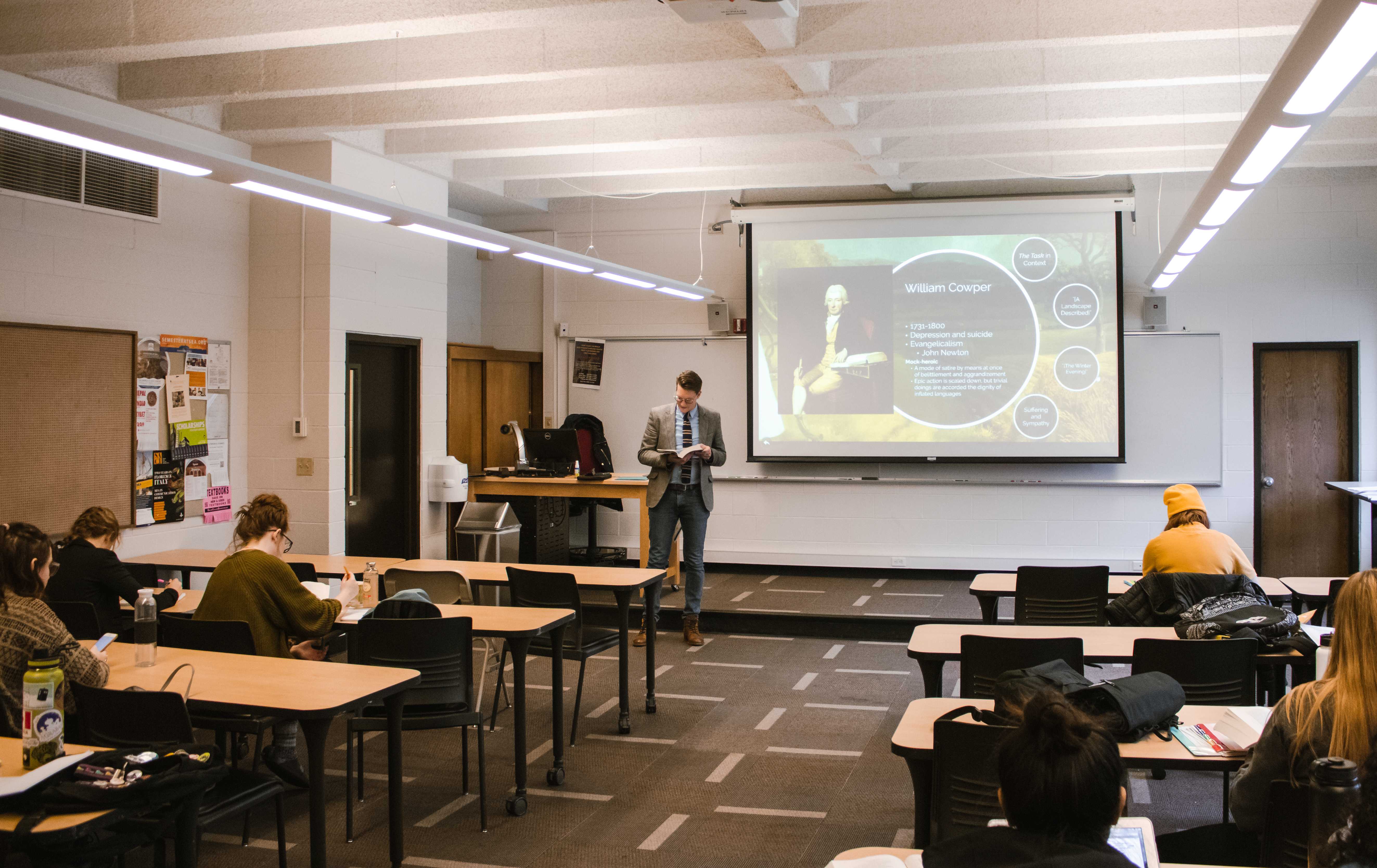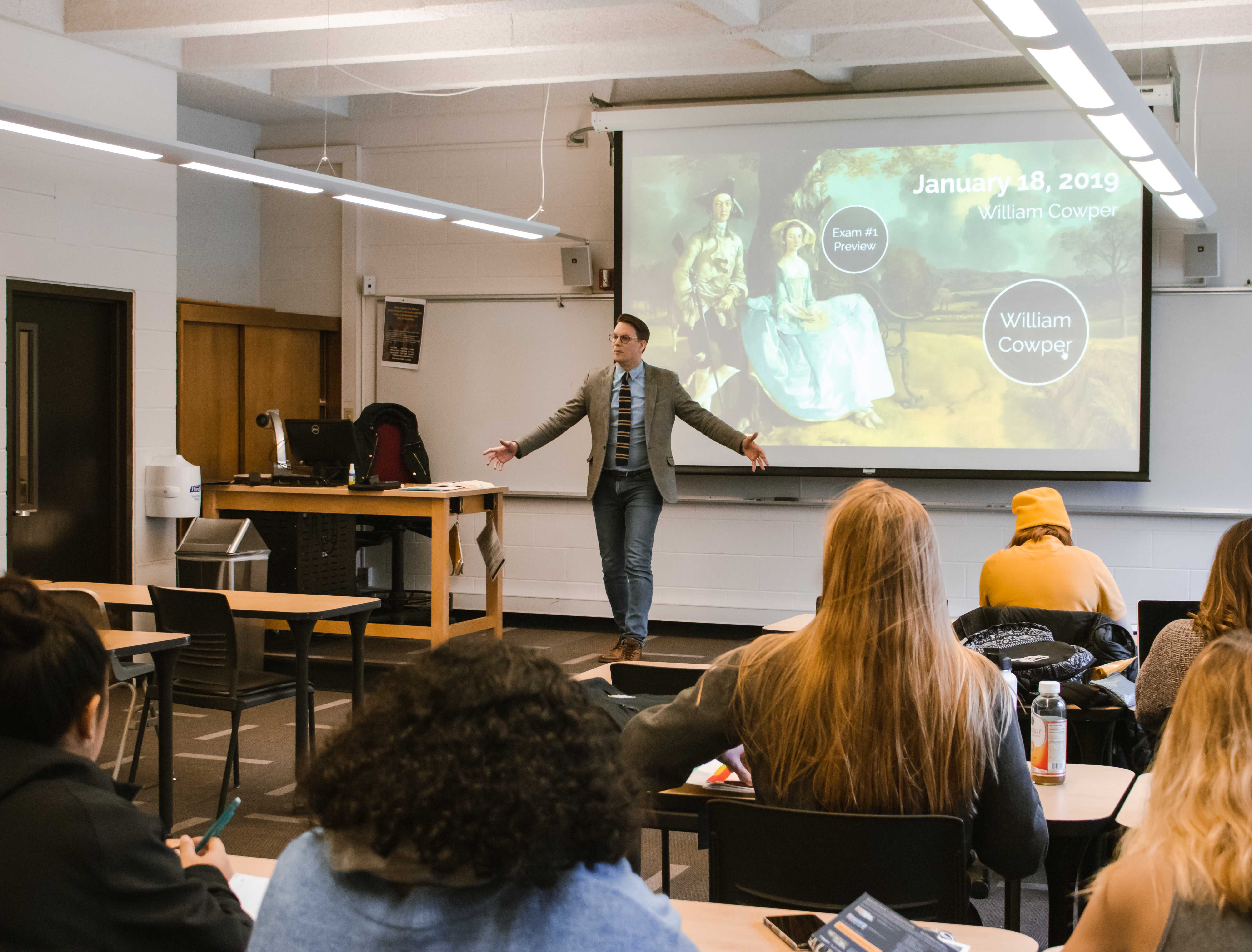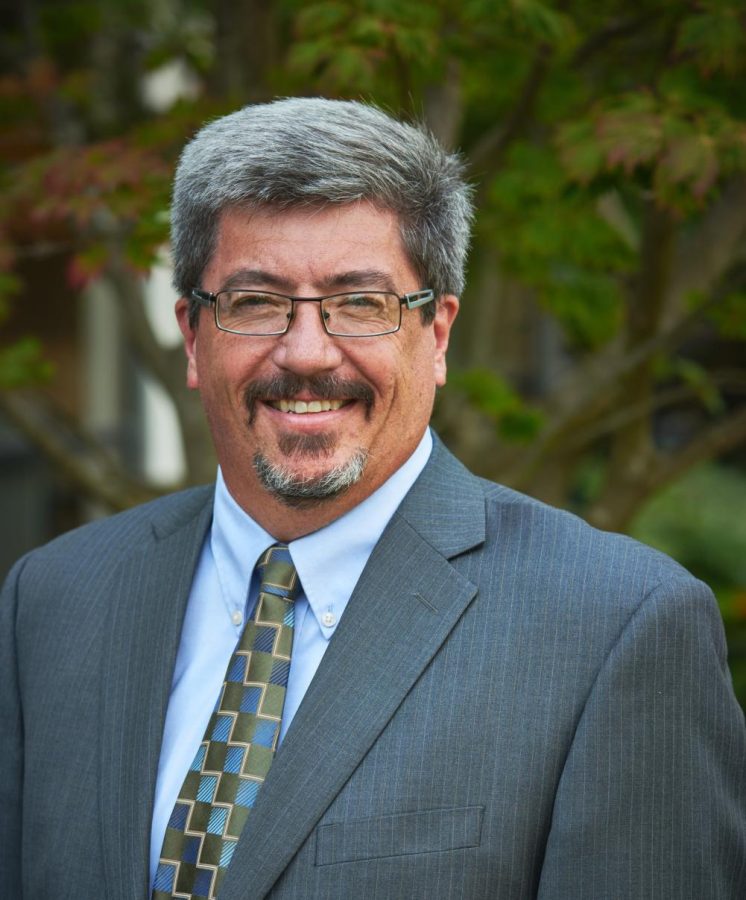A session of Writing 1000 begins. The 19 students in Traynor Hansen’s class have just turned in a paper. He announces that he will not assign another paper … until the end of class.
The students groan.
In moments like these, Hansen sees the contrast between who he is now and who he was when he began teaching at the University of Washington as a Ph.D student.
Looking back, he sees someone who was aloof, cool and arrogant, now knowing that his former students retained little from his classes.
“You know, they’d be entertained, I would be my boisterous, sort of performing self, but then the quarter would finish,” Hansen said.
Now Hansen, 37, strives to be emotive and genuine in the hope of being a better teacher.
He arrived in this role at Seattle Pacific University after years of trying to find a truer version of himself.
“Authenticity is not a learned thing, what makes it authentic is that it’s true,” he said. “So, in some ways, I’m learning how to let some of those postures down.”
His parents are pastors and missionaries. Hansen grew up in Washington, but moved to Bolivia in 1993 with his family — his parents, two older sisters and younger brother.
The family spent four and a half years in Bolivia.
For Hansen, the later years were punctuated by incidents of him and his best friend sneaking out to drink in the woods, buying cigarettes, wandering around town late at night and throwing Molotov cocktails at a classmate’s house.
The family moved back to the United States right before Hansen turned sixteen, between his sophomore and junior year in high school.
But the transition was more complicated than just moving back for the teenaged Hansen.
The conflict between the tight-knit communities he knew in Bolivia and the individualistic, materialistic attitudes of the United States fragmented Hansen’s life. He got angry at his parents, at the church and at his situation.
This defined who he gravitated towards when he began his junior year of high school in the United States. “I felt out of place and got involved in a group of people who felt out of place,” Hansen said.
He and his new group of friends experimented with drugs, primarily pot, LSD and alcohol.
On May 5, 1998, the situation escalated.
He was caught by his father while going off campus to smoke. The school had revoked his off-campus privileges, so his father reported Hansen to the school, and he was suspended.

In his frustration, Hansen and five of his friends packed their bags, piled into a Jetta and drove to the neighboring town of Wenatchee. In the days they were gone, Hansen said,
“We spent what little money we had on all the pot and LSD and alcohol we could find.”
When they heard that police had discovered where the were in Wenatchee, they moved on to another town.
They left on a Tuesday and were caught on that Saturday in Bellingham.
Hansen’s parents pulled him out of all of his classes except for three in the middle of the day. They let him keep his job at McDonalds, but he didn’t get a key to their house, meaning that his parents drove him to school and work.
His parents put him into an intensive rehab outpatient program, where three days a week, two hours a day, he met with a drug support group directed by a therapist at a clinic near his house. On the three days he was not at the clinic, he attended counseling.
“Basically, my parents put me on house arrest,” Hansen said. In isolation from his friends, Hansen found the space to get sober.
While he caught up during his senior year, the music programs at his high school became an important mechanism for straightening out his life. “That’s one of the things that made a really big impact in my life in that last year, just being really involved with the choir and the musical,” Hansen said.
When he graduated, his parents moved back to Bolivia after staying a year longer then they had intended. Hansen remained in the United States, continuing his education at Edmonds Community College and began working at a music store.
He struggled in his first year at community college — he almost failed choir — and dropped out after barely finishing his classes for that year. He devoted the rest of his time to work.
Hansen worked at a music store for three years. After rising up through store ranks as much as he could, he decided to go back to school at a different community college and finish his associate degree.
He then got married to his wife, Tricia and transferred to UW to finish his education.
Hansen focused his energy on his passion for English. After getting his bachelor’s degree, he immediately started on his master’s, which fed into his Ph.D. As a Ph.D student,
Hansen was offered the chance to co-teach an upper division English class on the Bible as Literature with a professor he had taken a course with in his undergraduate studies.
This professor, someone he respected and considers a mentor, became instrumental in his process of changing his attitude towards teaching.
The structure of the class allowed Hansen to watch part of the lectures that his mentor taught for this class. One of the lectures, which was on the story of Jacob and Esau, struck a note for Hansen.
“He’s talking about this, he’s just reading the text to the class, and gets visibly choked up at Esau saying, ‘But father, haven’t you saved some birthright for me,’” Hansen explained.

“And there was just a sincerity in that, and I was like ‘Wow, it’s okay to not be cynical and aloof and cool,’ and that’s something that really resonates with students.”
Having known him for years, Tricia watched Hansen wander through each period of his life.
When she met him at a summer camp in 1997, Hansen had just moved to the states with his family. They went to the same youth group through Hansen’s rebellious phase in high school, when he brought his friends to church.
“He would bring a whole posse to church,” Tricia said. “And they would be all dressed in black, and kind of gothic looking, like a cloud of smoke coming into the youth room.”
In 2001, they reconnected at a college Bible study and began dating in 2002.
Now, when Hansen is not chasing after his four children — a rare occurrence according to Tricia — he plays piano, guitar and avidly follows the Mariners.
“There’s a way that he’s sort of changed,” Tricia explained. “You think you can’t change person but maybe you can, just a little bit.”
Last spring, Hansen went on a silent retreat that had a similar impact that to the one his mentor had on him.
On the first morning, he went over all the scenarios of what he could say at breakfast to the other people who came on the retreat. But then he remembered, it was a silent retreat, he did not have to say anything.
“I just had this moment that was suddenly so freeing for me, that I can be in this place and I don’t have to be something for people,” Hansen said. He explained that after the years of needing to be liked, this retreat helped him realize that he was enough, for God, for students, for anyone.
Hansen doesn’t know entirely what it means to be the truest version of himself, he is still figuring out many elements of his life.
“I haven’t answered all those questions,” Hansen said. “But that’s what I’m working on.”














































































